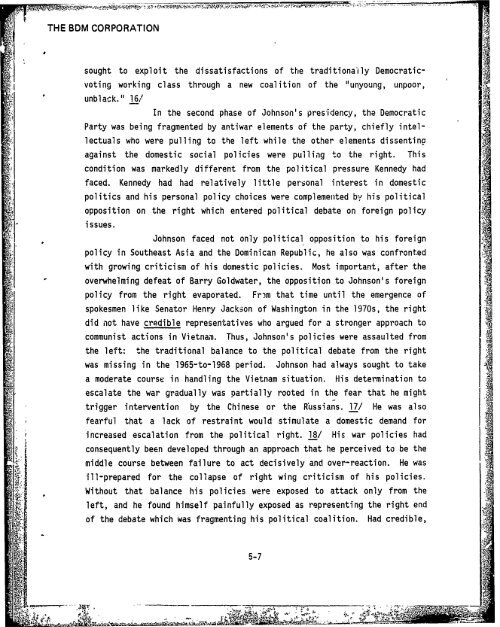policy - The Black Vault
policy - The Black Vault
policy - The Black Vault
You also want an ePaper? Increase the reach of your titles
YUMPU automatically turns print PDFs into web optimized ePapers that Google loves.
THE BDM CORPORATION<br />
sought to exploit the dissatisfactions of the traditionaily Democraticvoting<br />
working class through a new coalition of the "unyoung, unpoor,<br />
unblack." 16/<br />
In the second phase of Johnson's presidency, the Democratic<br />
Party was being fragmented by antiwar elements of the party, chiefly intellectuals<br />
who were pulling to the left while the other elements dissenting<br />
against the domestic social policies were pulling to the right. This<br />
condition was markedly different from the political pressure Kennedy had<br />
faced. Kennedy had had relatively little personal interest in domestic<br />
politics and his personal <strong>policy</strong> choices were complemented by his political<br />
opposition on the right which entered political debate on foreign <strong>policy</strong><br />
issues.<br />
Johnson faced not only political opposition to his foreign<br />
<strong>policy</strong> in Southeast Asia and the Dominican Republic, he also was confronted<br />
with growing criticism of his domestic policies. Most important, after the<br />
overwhelming defeat of Barry Goldwater, the opposition to Johnson's foreign<br />
<strong>policy</strong> from the right evaporated. From that time until the emergence of<br />
spokesmen like Senator Henry Jackson of Washington in the 1970s, the right<br />
did not have credible representatives who argued for a stronger approach to<br />
communist actions in Vietnam. Thus, Johnson's policies were assaulted from<br />
the left: the traditional balance to the political debate from the right<br />
was missing in the 1965-to-1968 period. Johnson had always sought to take<br />
a moderate course in handling the Vietnam situation. His determination to<br />
escalate the war gradually was partially rooted in the fear that he might<br />
trigger intervention by the Chinese or the Russians. 17/ He was also<br />
fearful that a lack of restraint would stimulate a domestic demand for<br />
increased escalation from the political right. 18/ His war policies had<br />
consequently been developed through an approach that he perceived to be the<br />
middle course between failure to act decisively and over-reaction. He was I<br />
ill-prepared for the collapse of right wing criticism of his policies.<br />
Without that balance his policies were exposed to attack only from the<br />
left, and he found himself painfully exposed as representing the right end<br />
of the debate which was fragmenting his political coalition. Had credible,<br />
5-7
















